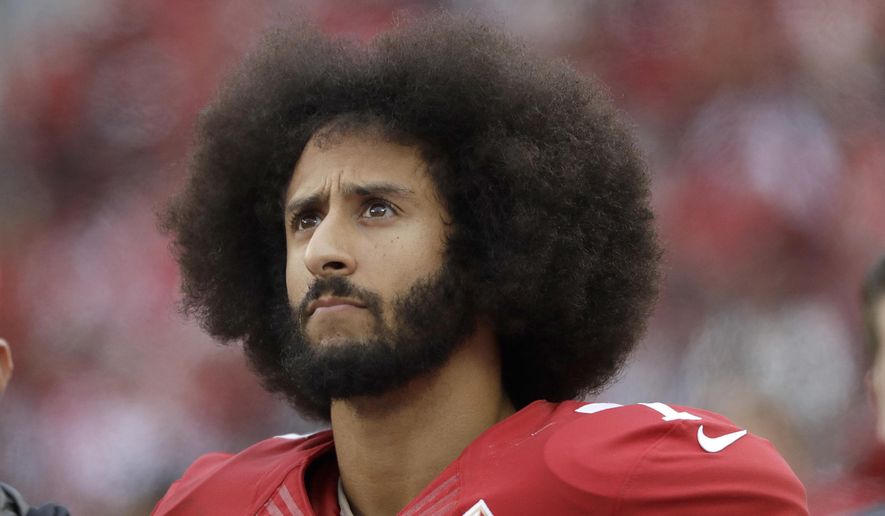Colin Kaepernick started out taking a knee during the national anthem to protest police brutality, but his activism has since expanded to encompass a wide range of leftist causes, including a group named after a convicted cop-killer.
The Colin Kaepernick Foundation donated in April $25,000 to Assata’s Daughters, a Chicago “direct action” resistance organization honoring Assata Shakur, who escaped prison and fled to Cuba after being found guilty in the 1973 murder of Officer Werner Foerster.
The grant includes $2,500 for CopWatch, a program that trains volunteers to follow and video police, and $15,000 for teen training, part of the group’s commitment to “develop and train young people, ages 4-19, in the Black queer feminist tradition and in the spirit of Assata.”
Apparently Mr. Kaepernick is also a fan: He retweeted a July 16 message wishing Shakur a happy birthday.
The contribution came as part of Mr. Kaepernick’s pledge last year to donate $1 million over 10 months to “organizations working in oppressed communities.”
So far he has given $900,000 in grants to 31 organizations, including apolitical services like Meals on Wheels as well as advocacy groups pushing a left-of-center agenda on issues like abortion, climate change, criminal-justice reform and immigration.
Contributions include $25,000 for 350.org, a climate-change group dedicated to fighting fossil fuels, and $25,000 for the Center for Reproductive Rights, a pro-choice advocacy organization.
The foundation gave $50,000 in December for a “health clinic partnership” at the now-defunct Dakota Access pipeline protest, and $25,000 to United We Dream in order to “keep DACA in force,” referring to President Obama’s Deferred Action for Childhood Arrivals executive order.
The former San Francisco 49ers quarterback also has close ties to the Women’s March, including organizers Tamika D. Mallory, Carmen Perez and Linda Sarsour.
The Kaepernick Foundation donated in June $25,000 to the Gathering for Justice NYC, headed by Ms. Perez, while Ms. Mallory and Ms. Sarsour appeared at the Aug. 24 pro-Kaepernick rally outside NFL headquarters.
Part of the Kaepernick Foundation’s $33,000 donation for the Lower East Side Girls Club was designated for travel and lodging for the Women’s March convention in October.
The Women’s March returned the favor with a shoutout Sunday on Facebook with a post saying, “#TaketheKnee [is] on the right side of history today — not just NFL players, but all of YOU. Show your support for the athletes siding with justice.”
The Women’s March has its own Shakur connection: The group came under fire in July for a tweet celebrating the birthday of Shakur. Shakur was placed on the FBI’s most-wanted list as a “domestic terrorist” who belonged to an “extremist group,” the Black Revolutionary Army.
The backlash included a tweet from Sen. Marco Rubio, Florida Republican, who said, “Unbelievable that anyone would idolize a cop killer.”
Assata’s Daughters has been upfront about its admiration for Shakur, saying on its website that it “carries on the tradition of radical liberatory activism encompassed by Assata Shakur.”
“Basically our organization is a part of a much larger movement that is fighting for the abolition of prisons, police and anti-blackness itself,” said Assata’s Daughters adult coordinator in a video.
Shakur, who was wounded in the 1977 shootout on the New Jersey turnpike that left two dead, including the officer, has argued that her murder conviction and life sentence were part of a “political prosecution” at the hands of a “racist legal system.”
Formerly Joanne Chesimard, she has since become a martyr on the left, drawing support from high-profile activists, like Angela Davis.
In 2015, New Jersey Gov. Chris Christie called on the Obama administration to extradite her after normalizing relations with Cuba.
Assata’s Daughters described its role as “one of helping to escalate, deepen and sustain the Black Lives Matter movement.”
“We believe it is our duty to fight for our freedom,” the group says on its website. “We believe it is our duty to fight for freedom. We come together in struggle as radical Black feminists and organizers, under the shared respect, love and study of Assata Shakur.”
During the 2016 NFL season, Mr. Kaepernick touched off a political uproar over his refusal to stand for the national anthem, citing high-profile shootings of black men by police and what he called “systematic oppression” of U.S. minorities.
Mr. Kaepernick later faced criticism for his defense of former Cuban strongman Fidel Castro and wearing a T-shirt showing a 1960 meeting between Castro with Malcolm X.
• Valerie Richardson can be reached at vrichardson@washingtontimes.com.




Please read our comment policy before commenting.